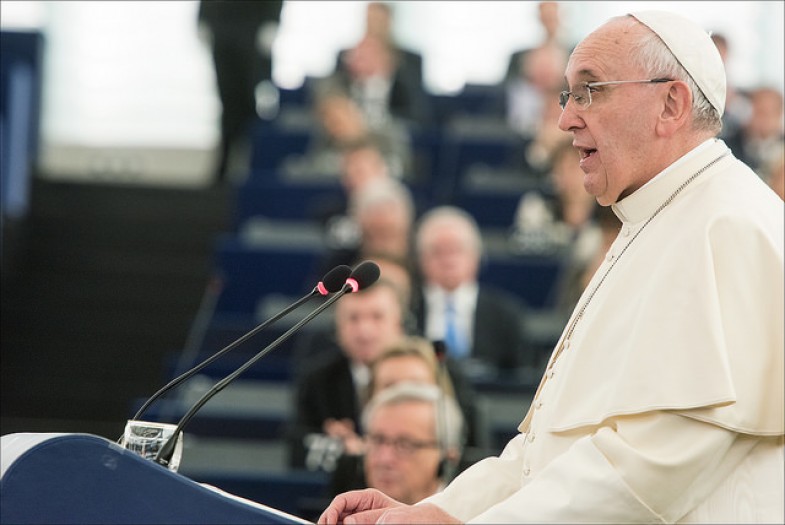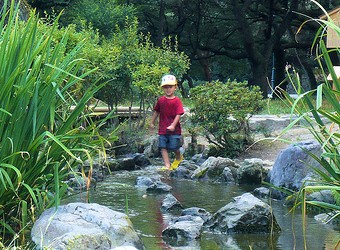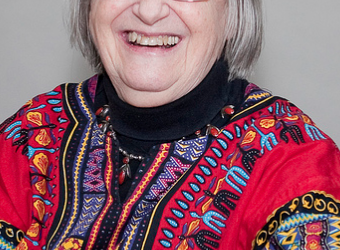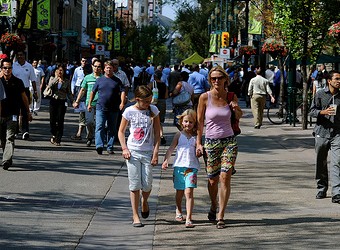One expects a debate about Pope Francis’ new encyclical to form around the details of climate science, or the efficacy of carbon credits, or the theological merits of ecology. But a stranger, subtler difference of opinion has emerged, one that I suspect has more political consequence than it lets on: the interpretation of mood.
The New York Times and The Washington Post have published thought-provoking, if somewhat mystifying, essays that consider the pope’s tenor to be a dour one. The authors, Ross Douthat and Matthew Schmitz—both with ties to the journal First Things, for whatever that’s worth—stand in contrast with the responses of many of their fellow Catholics to “Laudato Si’,” which have tended to be either evasive or celebratory. They engage, but without much rejoicing.
Douthat refers to the encyclical as “sprawling” and “apocalyptic,” bearing the message that “current arrangements are foredoomed” in the absence of cataclysmic revolution. Schmitz holds that “Pope Francis wants to roll back progress,” and that the encyclical “is the work of a profoundly pessimistic man” intent on “opposing modernism—that old antagonist of the Church.” He speaks of its “forboding” and likens it to Pope Gregory XVI’s anathematizing of railroads.
Both writers have something nice to say about the questions that the document raises, but they meanwhile give readers sympathetic to modern economic and technological progress a handful of reasons, either stated or implied, to be less than enthusiastic about the pope’s call to action for climate justice.
“Critics,” writes Schmitz of the pope, “will seize on his dark tone, but Francis’ letter offers a challenge worthy of serious consideration.”
I suppose these things are in the eye of the beholder. But I read the mood of the encyclical quite differently. Its title translates as “praise be to you,” quoting a prayer that revels in the glory of God’s creation. It ends with those words as well. It extols the relationships among human beings and our bond with the universe God has made. It describes good progress being made around the world, by Catholics and non-Catholics alike. It proposes an “integral ecology” that honors divine creation through human flourishing. It talks a lot about love and harmony. At its center is the incarnate Christ, resurrected in our midst.
The encyclical surely sounds an alarm about environmental sin; I don’t think anyone can deny that human beings have sorely neglected our calling to stewardship. Yet many of the recommendations are both familiar and already underway, like global regulatory institutions and renewable sources of energy.
Rather than the “catastrophist” revolution Douthat detects, Pope Francis describes his primary ambition as being for “dialogue” among various sectors of society. The most drastic longings—for an economy not centered on profit, for a conversion away from materialism—are classic Catholic social teaching. Yes, this is radical in comparison with our present global order, but it shouldn’t come as a surprise. He calls for a multi-leveled conversion that takes many different forms in many different contexts, according to the principle of subsidiarity. “Truly, much can be done!” Francis exclaims at one moment of enthusiasm.
When I first began reading the final text, I wept. There was lamentation in that, and repentance. But mostly those were tears of consolation and of hope.
What accounts for this difference of perception? I can’t claim to know for sure. And there’s at least some degree of confirmation bias at work. I have felt implicated in the violence of environmental destruction since grade school; in the years since I’ve come to see an economic system built around short-term corporate profits as its principal engine, and the poor as its principal victims. The encyclical appears to baptize my long-held beliefs, and admittedly there is some pleasure to be had in that. But there is also humility in this for me. The pope’s option for the world’s poor means that the wisdom of poverty must be at the center of our dialogue, correcting whatever received ideologies stand in the way.
Hope can be aided by glimpses. I spend a lot of my time working among social movements involved in resistance and alternative-building, so I see the seeds of possibility—stuff Pope Francis mentions like cooperatives and localized economies—in the present, not in some far-off dystopian future. They exhibit the promise of enterprise and innovation without the grabbier qualities of capitalism; they remind me that we can manage resources as commons, not relying so much on corruptible governments, or unaccountable markets, or the largesse of the rich. Because I like to experiment with community-based technology, I can accept the pope’s critique of consumerist devices without worrying that it might take us back to the Stone Age.
I don’t claim, and I don’t think Francis claims, to know all the answers about what we’re to do. I also claim no special knowledge or insight into the workings of his mind. But we do need an honest dialogue. To me the dialogue he proposes is thrilling, not depressing, and it’s not especially apocalyptic to say that such a dialogue is long overdue. We need the dialogue to include hard questions, such as some of those that Schmitz and Douthat raise, so I hope they’re serious about continuing to engage in it.
Yet Pope Francis himself seems to expect, and resist, the temptation of some to read his exhortation as a downer. He wants to leave us with a “yes” louder than any “no.” “It is a matter of openness to different possibilities,” he insists, “which do not involve stifling human creativity and its ideals of progress, but rather directing that energy along new channels.”
And as any good Christian might, the pope finds hope in faith. “Mary, the Mother who cared for Jesus, now cares with maternal affection and pain for this wounded world,” he assures us. And at the end he prays,
O Lord, seize us with your power and light,
help us to protect all life,
to prepare for a better future,
for the coming of your Kingdom
of justice, peace, love and beauty.
I don’t see in this the prayer of a pessimistic man, and it eludes me to grasp how anyone would.







